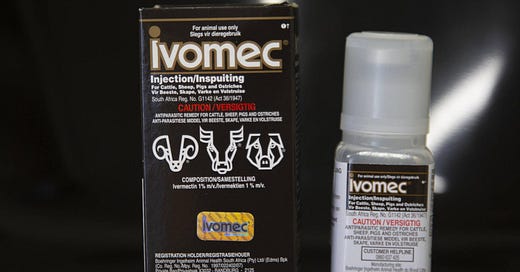Last month, Japanese pharma company Kowa put out a press release of the results of its 1030-person double-blind randomised control trial (RCT) of Ivermectin conducted at 54 institutions in Japan and 2 in Thailand.
Here’s how the results were reported in The Japan Times.
Not effective, you hear! I mean, look at the photo. You don’t get Ivermectin from a pharmacy; you get it from a farmer. Anyway, on to the trial.
A clinical trial was unable to prove the efficacy of the antiparasitic medicine ivermectin against coronavirus variants, according to Japanese drugmaker Kowa Co., which has indicated that it will no longer seek approval for the drug as a COVID-19 treatment.
So this means that not only has IVM not been widely used in Japan (despite what many people outside Japan think) but probably never will be. So what happened? Did the people who took the anti-vaxers’ favourite veterinary medicine all get sick?
In the trial, 1,030 patients with mild COVID-19 were orally administered the drug daily for three days and then compared to others given a placebo.
Ivermectin was found to be safe and few people given the drug developed severe symptoms, Kowa said. But both the group given the drug and the one administered a placebo saw improvements in symptoms, meaning the trial did not show the drug’s efficacy over the placebo as a COVID-19 treatment.
So the reason Kowa was “unable to prove the efficacy” wasn’t because IVM is “not effective”; it was because almost everyone in the placebo group got better quickly too. According to Kowa’s press release, “Both intervention and placebo arms showed milder symptoms around 4 days after the start of administration” and “There were no deaths and hardly any severe cases.”
Although Kowa hasn’t released the full trial details or results, the 0% mortality rate among the 500+ participants in the placebo arm suggests they were mostly at very low risk of severe disease. So the results don’t show IVM was ineffective; they show no medication was necessary for these participants to prevent symptoms worsening or for them to recover quickly.
This a not a new issue in studies on early treatments. Yale epidemiologist Harvey Risch noted the same thing in RCTs showing non-significant effects for another “controversial” drug, hydroxychloroquine.
The RCT studies proclaimed supposedly as definitively showing no benefit of HCQ use in outpatients have all involved almost entirely low-risk subjects with virtually no hospitalization or mortality events and are uninformative and irrelevant for bearing upon these risks according to HCQ use in high-risk outpatients.
When tested on larger numbers of people for mortality benefit, IVM often performs a bit better.
Next, let’s compare how the JT reported Kowa’s IVM trial press release with how Reuters reported Shionogi’s press release for its 1821-person RCT of its anti-Covid drug ensitrelvir.
Japan's Shionogi & Co Ltd said on Wednesday its oral treatment for COVID-19 demonstrated a significant reduction in symptoms compared with a placebo in a Phase III trial in Asia.
The drug, a protease inhibitor known as ensitrelvir, met its primary endpoint in a trial conducted among predominantly vaccinated patients with mild to moderate cases of COVID-19, the company said in a statement.
A significant reduction in symptoms! So how many people were kept out of the ICU? Well, the Reuters article didn’t clarify what the main result was, so here it is from Shionogi’s press release.
the median time to resolution of the five COVID-19 symptoms [stuffy or runny nose, sore throat, cough, feeling hot or feverish, and low energy or tiredness] was significantly reduced in those treated with the low dose of ensitrelvir (the dose level submitted for approval in Japan) compared to placebo: 167.9 hours versus 192.2 hours, a statistically significant difference of 24 hours (p=0.04).
Yep, ensitrelvir cleared runny noses 1 day quicker than a placebo. So the media reporting of Shionogi’s results wasn’t dishonest, but it wasn’t exactly candid.
Similar to in Kowa’s IVM trial, no deaths were reported among the 900+ placebo recipients in Shionogi’s trial, which again suggests they were very low risk. So these results give us no idea about whether ensitrelvir will prevent the progression to severe disease in high-risk immunocompromised people, which is what actually matters.
Shionogi also reported that no serious adverse events occurred in the intervention arm. But one problem with not trialing a medication on the type of high-risk people who will actually need it is that the trial probably won’t pick up major safety signals that become clear later.
But as El Gato Malo has said, pharma doesn’t make mistakes in trial design; it makes choices.









Harvey Risch is at Yale, not Harvard.
The entire Covid protocol must be studied. On its own, IVM is not as effective without quercetin and Vit D. Vitamin D is the acting agent. But how do you get the D into the cells? HCQ and IVM are the delivery agents.
One study was done on HCQ during the “pandemic” and Dr. Zelenko, widely credited with developing the Covid protocol, noted that since Vit D wasn’t used with it, the study didn’t matter. This Japanese study also failed to use Vit D.
Go back and study the Zelenko protocol. Zelenko explains the importance of each pill and supplement that ACT TOGETHER. His plan included quercetin, Vit D3, Vit C, and the Z pack antibiotic, taken in concert with HCQ or IVM.
That people—and studies—keep failing to recognize this is continued disinformation.